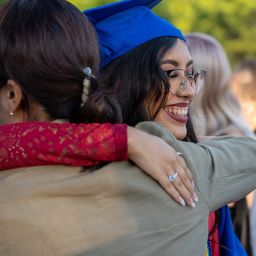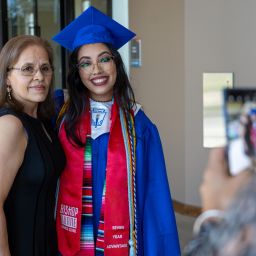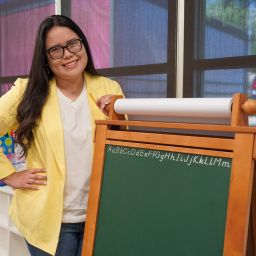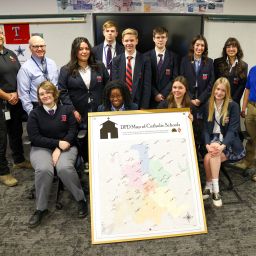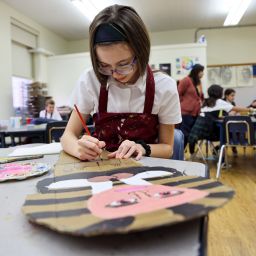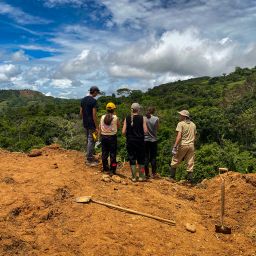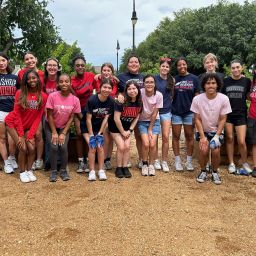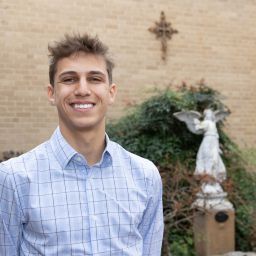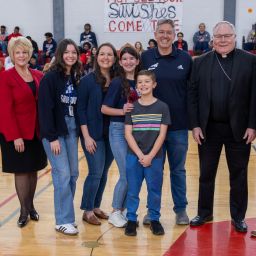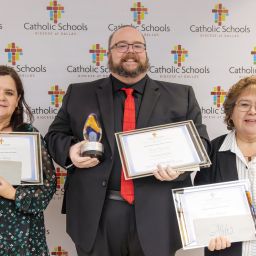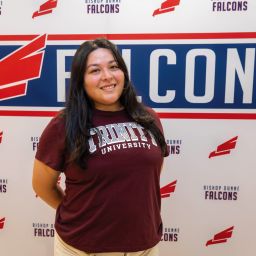
By Michael Gresham
The Texas Catholic
Necessity often fuels invention.
In the case of Bishop Dunne Catholic School senior Sylvester Lopez, necessity combined with some quick-thinking innovation by staff members led to creation of a tool to help the student stay on track.
Lopez suffered an injury during football practice in the fall when a teammate accidentally kicked his hand.
“At first, we thought it was just swollen so I played through the season,” Lopez said. “Following the season, though, it was still painful, so I went for an X-ray, which showed it was fractured.”
The injury required surgery to be repaired, having Lopez fitted for a cast and looking at months of physical therapy. Unfortunately, the injury also was to his writing hand, which made it extremely difficult for Lopez to write legibly and had a negative impact on his schoolwork.
“I learn when I write my notes in class,” said Lopez, explaining that he was finding it hard to retain the information he was hearing in class lectures when he couldn’t take notes. “I was able to record the lectures, but it wasn’t the same. I was struggling.”
Leslie Folz, who serves as the director of learning resources for Bishop Dunne, sought to find a physical aid to help the injured student write.
“I had been writing for him because he could not,” she explained. “Due to the location of his injury, they immobilized his hand in a way that his fingers stuck out of the cast, but he could not properly use them.”
Folz had seen writing aids at education stores in the past, but the closest one to her location was no longer in business. Undeterred, Folz turned to one of her peers on the Bishop Dunne staff.
“She asked if I thought I would be able to use the 3D printer to create something to help Sylvester write,” said Vladimir Sosa, a Bishop Dunne alum who teaches physics, robotics and engineering at the Oak Cliff school. “I went online and found a template. We printed a couple of different sizes as prototypes. He chose the one that worked the best, and then I customized it for him.”
Lopez said he was excited when they first told him about the writing aid as it would allow him to be more independent and effective at his schoolwork.
“It was really a big help and it allowed me to keep up with my classes,” Lopez said.
Folz explained that the aid helps because it relies on gross motor skills.
“Gross motor is a lot easier than fine motor,” Folz explained. “It made it a lot easier for him. He even started doing it with his left hand, which made him even more independent.
“I think every student wants to be independent,” she added. “They don’t want a teacher to write for them. They want to be able to do their work themselves.”
The Bishop Dunne senior said he’d not experienced such support at other schools he attended and was appreciative that the school helped him in this way.
“I am thankful for Mr. Sosa and his help in developing the writing tool,” Lopez said. “And I am truly appreciative of both Mr. Sosa and Mrs. Folz for caring and thinking of engineering this tool to help me.”
For his part, Sosa said the work has inspired him to consider future class projects where students go into online forums, read over the requests for custom designs aimed at helping people who have injuries or disabilities, and then develop solutions.
“I think it is more meaningful for the students when they feel they are actually solving real-life issues,” Sosa said.

